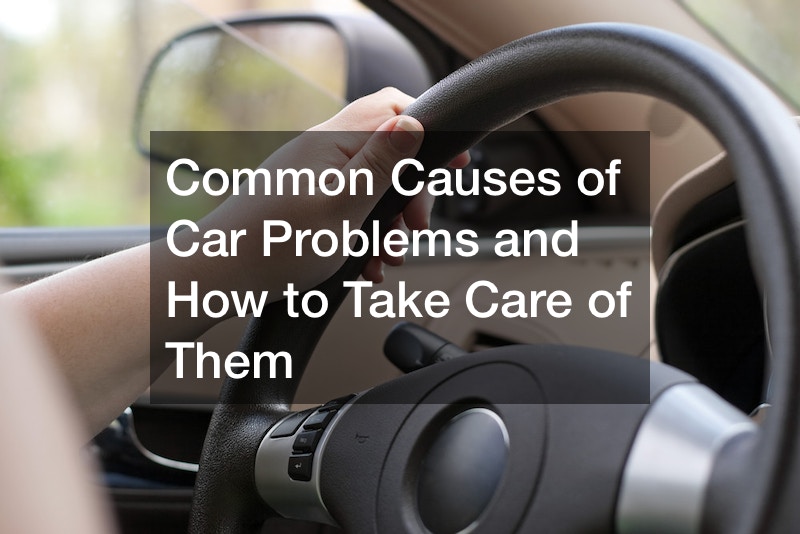
Car troubles are an unavoidable part of life. For the inexperienced driver, they often arise out of nowhere and leave them nervous and confused. Unable to identify the problem, they often just keep driving the car or get swindled by a mechanic who senses their inexperience. In this guide, we’ll break down common car issues and the best ways to resolve them.
Brake Issues

First up, brake issues. Brakes are a vital part of the car, and it’s important to keep them well-maintained for that reason. It’s not a good idea to get up to high speeds if you can’t stop.
Old Brake Fluid
Brake fluid should be changed every two to three years, or roughly every 45,000 miles. When brake fluid gets old, it changes color, and it can cause water and other undesirable things to build up in the brake system. This can cause faulty breaks. If you notice your brake fluid is not the normal color, you should bring it to a mechanic and have it changed.
Faulty Brake Pads
Brake pads need to be changed roughly every 10 to 20,000 miles. As they wear down, they become increasingly less effective and can become a safety hazard. If you notice your brakes start to squeak, grind, take longer to slow down, or your brake light comes on, take it to a mechanic and have the pads changed as soon as possible.
Engine Problems

Engine problems are extremely common in older cars. They can be very serious since the engine is what powers your car and allows it to move. If you notice your check engine light on or other symptoms of engine failure, the issue should be addressed immediately.
Engine Overheating and Failure
If you are driving down the road and you notice your temperature gauge going from normal to hot, pull over immediately. You may also notice a weird smell or smoke coming from under the hood. If the driver fails to stop, it can cause permanent damage to the engine, and it may even catch fire. It may even stop while you’re driving down the road. This issue may be caused by coolant leakage or a variety of other factors. The driver should call auto towing services and take the car to a mechanic for further auto repair. These sorts of problems are usually not solvable with DIY solutions.
Rough Idling
If you notice your car is loud or unsteady when idling, this could indicate several problems. One common problem this is indicative of is an issue with the fuel injectors or the exhaust system. Unless you are familiar with cars, you should not try to identify or repair car issues alone. This may cause further issues with the vehicle.
Strange Noises
Sometimes, a car’s engine will make weird noises when there is a problem. If there is a knocking, grinding, or squealing sound coming from the car, this is a very serious issue. Depending on the sound, it may indicate a variety of problems. For example, a knocking sound could indicate an engine misfire or an engine that’s in need of a tune-up. A squealing sound could indicate worn belts. If you’re unsure of the source of the noise, it’s best to take the car to a mechanic for further inspection before the issue progresses.
Transmission Problems

Transmission problems are especially common in older cars. The transmission is a gearbox that transmits power from the engine to the tires. A transmission failure can render the car completely inoperable.
Slipping
When a transmission is starting to fail, gears may slip when they are supposed to shift. This is a malfunction resulting from friction or other wear and tear in the gears. You will notice when a gear is slipping because the shift will not feel like normal. This can be dangerous since, as wear and tear progresses, the shift may fail completely, leaving your car stalled.
Strange Noises
Sometimes strange noises may come from the transmission, such as grinding or clunking. This may indicate wear and tear and the beginning of a transmission failure. Whenever a car starts making a noise you’re unfamiliar with, the source of the noise should be identified as quickly as possible.
Hard Shifting
In combination with strange noises, hard shifting is an indication of a serious problem with the transmission. The car makes a clunk and jerk when it shifts into worn gear. As the issue progresses, it may also result in stalling. If you notice this, take your car to a mechanic, as it may be time to have the transmission completely replaced.
Common Wheel Assembly Issues

Up next, we’ll cover some common issues with the wheel assembly. This includes the tires, steering, and suspension systems. These are the parts of the car responsible for keeping it stable, safe, and moving on the road. Some issues that occur with these systems can be extremely dangerous if you continue to drive with them.
Broken Shock Coils
Shock coils are a part of the car responsible for absorbing the shock from bumps you drive over. As this part ages, it may get rusty and break. You’ll notice a far bumpier ride when this happens. Shock coils are not extremely difficult to replace on your own; however, you may feel more comfortable taking them to a mechanic for this type of issue since it is a bit complex.
Difficulty Steering
Another common issue is difficulty turning the steering wheel. This is usually the result of an issue with the power steering fluid or something else in the power steering system. Sometimes there may be a leak, and you may be able to get away with simply topping up the fluid every so often. However, it is usually wisest to have the system properly repaired. If the car’s wheels do not turn when the steering wheel does, it may indicate faulty sway bar links or another issue that makes the vehicle dangerous to drive. In that case, take the car to a mechanic immediately.
Pulling to One Side
A very common issue people experience is their car pulling to one side of the road when driving down the highway. This is simply indicative of a wheel misalignment. This can usually be resolved by taking the car in for an alignment and tire rotation.
Body Issues
Damage to the car’s body is especially common after an accident or with normal wear and tear. Some of these issues can be inconsequential, while others should be repaired as quickly as possible for the safety and longevity of the vehicle.
Dents
These include auto accidents to the car’s body. These can be unsightly, and some may even impede the car’s function. If you’ve recently gotten into an auto accident, you better hope that you have a home and auto insurance service. You may even want to hire an auto accident attorney or lawyer. Some small dents can be popped out yourself, but others need to be brought into a body shop. When repairing dents, you may even want to upgrade your car a bit. For example, while repairing your truck bed, you may want to add a truck bed cover to protect it from further damage.
Rust
Rust is extremely common for cars as they age, especially those used in areas with cold winters. Any rust on your car should be repaired as quickly as possible since it will spread and further damage the body. Rust on parts underneath the car can also impede its function. Usually, you’ll want to take it to a body shop that can leave your car looking as good as new. Sometimes, you may be able to repair small patches of rust yourself.
Windows
Accidents or situations where a rock is kicked up and causes broken windows or windshields are common occurrences. It is generally unsafe to drive with a broken window, so the car should be brought to an auto windshield repair service. In situations like these, you may also want to add some flair to the car by adding some auto tinting. It’s a great way to make the most of a bad situation.
Broken Parts
When you back into something or sideswipe your car, parts may be broken off, such as the tow hitch or the mirrors. It may also fall off for other reasons. Generally speaking, you won’t want to drive around with these things hanging off of your car or missing completely. If you tow a trailer frequently, you’ll really want to replace your tow hitch. Some can be replaced yourself; otherwise, just take it to a body shop.
Other Common Issues
We’ve covered the major components of the car that are subject to malfunction. In this section, we’ll address some smaller issues that can have big consequences. Remember that a car is a very complex machine, and there are any number of issues you may encounter with it.
Leaks
Leaks are a very common occurrence, especially in older cars. It’s important to identify which fluid is leaking. It may be the oil, coolant, power steering fluid, or something else completely. For some of these issues, you can simply buy a can of leak stop and pour it in the appropriate place. This is a great solution for minor leaks, but larger leaks will require a visit to the mechanic. If you suspect that your car is leaking coolant or oil, be very careful. Driving with low levels of these fluids can cause serious permanent damage.
Electrical Issues
There are a wide variety of electrical issues that can occur. For example, the sensor that reads your fuel level may go haywire, resulting in inaccurate readings. The battery or alternator may fail, the wiring can go bad, etc. Cars run off of electrical wiring, fuses, and more, and so it’s important to have the right electrical system in good working order. It can sometimes be hard to pinpoint electrical issues with your vehicle, so if you’re unsure what to do, consider taking your car in for an inspection at your local auto repair shop.
Exhaust
The exhaust system is responsible for getting waste material out of the car. Your exhaust may drip, which may be normal in some cases. It may also smoke. The color of the smoke indicates the source of the exhaust problem. For example, if the exhaust emits white smoke, it may indicate burning coolant. Black smoke may indicate burning oil. Some cars may be particularly loud as a result of a faulty muffler. If this is the case, take the car in to your local auto repair shop for muffler repairs.
Ventilation
Last but not least, in the car, ventilation issues are particularly common. These may include strange smells coming from the vents, no air conditioning, or wonky temperature controls. Many people have driven a car with no air conditioning in the summer and know that it is absolutely no fun. A faulty air conditioner can have a variety of causes, including a broken AC compressor. It may also be the result of an electrical issue. Generally speaking, you want to take the car to a mechanic to resolve these issues before they lead to bigger problems later down the line. If weird smells are coming from the vents, it can be unsafe to drive the car since exhaust may be coming back in. Do not allow these issues to linger longer than necessary.
We’ve covered several common issues that motorists run into with their cars. Most of these occur in older cars, but any car can experience malfunctions. A car is a complex system with a lot of parts, and they should all be inspected regularly. These parts include the transmission, engine, steering assembly, exhaust system, and body. Sometimes, DIY solutions will suffice, but in most cases, a trusted professional should be the one to repair the vehicle. Always do thorough research and never be unsafe while trying to repair your own car. Only work with professionals who you trust and who have a good reputation in your community.




